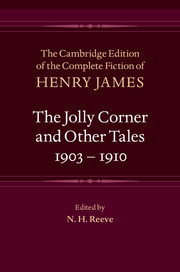Book contents
- Frontmatter
- Contents
- Acknowledgements
- List of Abbreviations
- General Editors’ Preface
- General Chronology of James’s Life and Writings
- Introduction
- Textual Introduction
- Chronology of Composition and Production
- Bibliography
- The Jolly Corner and Other Tales 1903–1910
- Glossary of Foreign Words and Phrases
- Notes
- Textual Variants
- Emendations
- Appendices
A - Extracts from James’s Notebooks
Published online by Cambridge University Press: 11 April 2021
- Frontmatter
- Contents
- Acknowledgements
- List of Abbreviations
- General Editors’ Preface
- General Chronology of James’s Life and Writings
- Introduction
- Textual Introduction
- Chronology of Composition and Production
- Bibliography
- The Jolly Corner and Other Tales 1903–1910
- Glossary of Foreign Words and Phrases
- Notes
- Textual Variants
- Emendations
- Appendices
Summary
Henry James's Notebooks are collected in Volume XXXIV of The Complete Fiction of Henry James. The editor of that volume, Philip Horne, has excerpted and prepared the text for this Appendix, and has supplied essential annotations. The following passages are drawn from a number of volumes of James's notebooks in the Houghton Library, Harvard (MS Am 1094 (vols. 1, 3, 4, 6)), running from 7 November 1878 to 10 February 1909.
The Birthplace
Lamb House, June 12th. 1901.
The other day at Welcombe (May 30th or 31st;) the Trevelyans, or rather Lady T. spoke of the odd case of the couple who had formerly (before the present incumbents,) been for a couple of years – or a few – the people in charge of the Shakspeare [sic] house – the Birthplace; which struck me as possibly a little donnée. They were rather strenuous & superior people from Newcastle, who had embraced the situation with joy, thinking to find it just the thing for them & full of interest, dignity, an appeal to all their culture & refinement &c. But what happened was that at the end of 6 months they grew sick & desperate from finding it – finding their office – the sort of thing that I suppose it is: full of humbug, full of lies & superstition imposed upon them by the great body of visitors, who want the positive impressive story about every object, every feature of the house, every dubious thing – the simplified, unscrupulous, gulpable tale. They found themselves too “refined,” too critical for this – the public wouldn't have criticism (of legend, tradition, probability, improbability) at any price – & they ended by contracting a fierce intellectual & moral disgust for the way they had to meet the public. That is all the anecdote gives – except that after a while they could stand it no longer, & threw up the position. There may be something in it – something more, I mean, than the mere fact. I seem to see them – for there is no catastrophe in a simple resignation of the post, turned somehow, by the experience, into strange sceptics, iconoclasts, positive negationists. They are forced over to the opposite extreme & become rank enemies not only of the legend, but of the historic donnée itself.
- Type
- Chapter
- Information
- The Jolly Corner and Other Tales, 1903–1910 , pp. 541 - 550Publisher: Cambridge University PressPrint publication year: 2017



